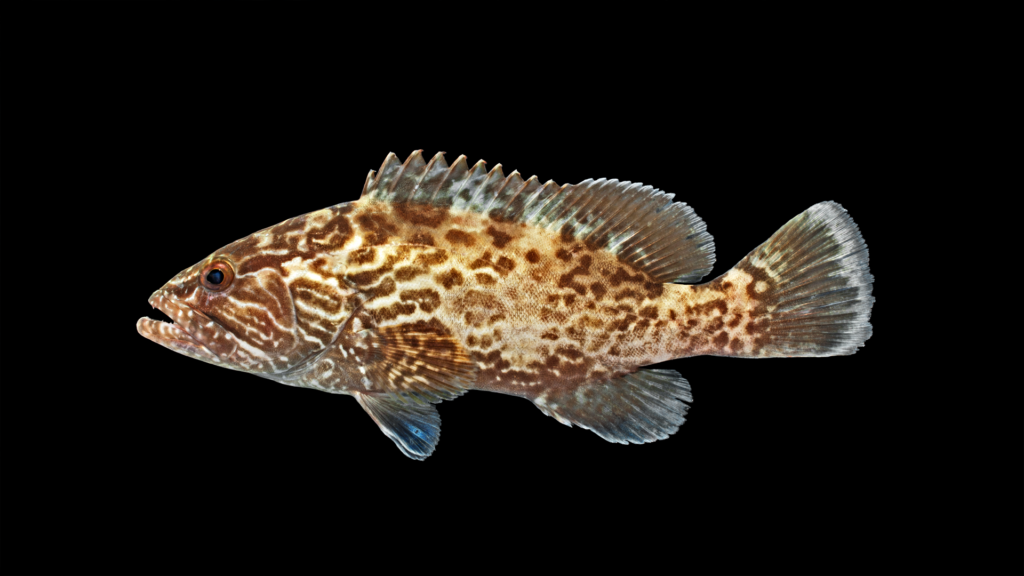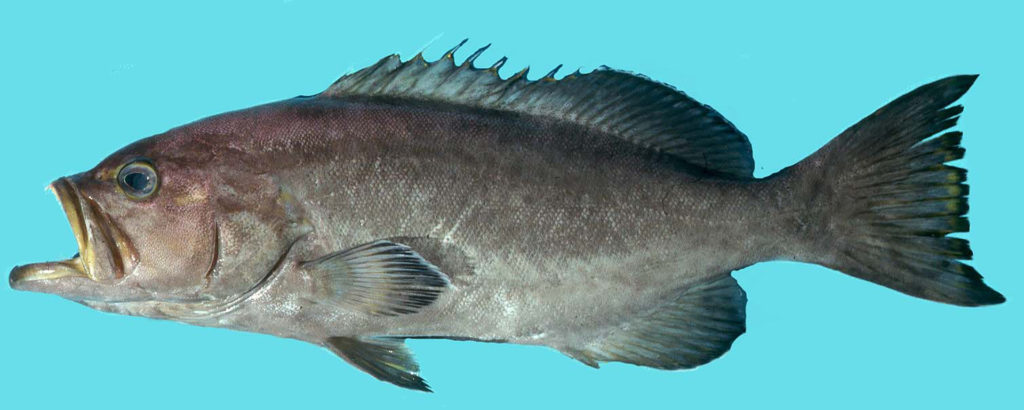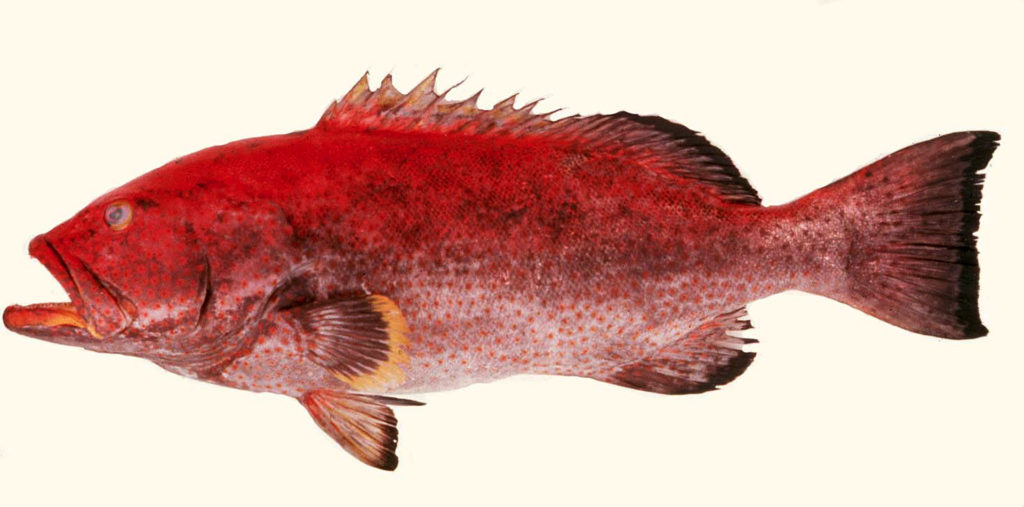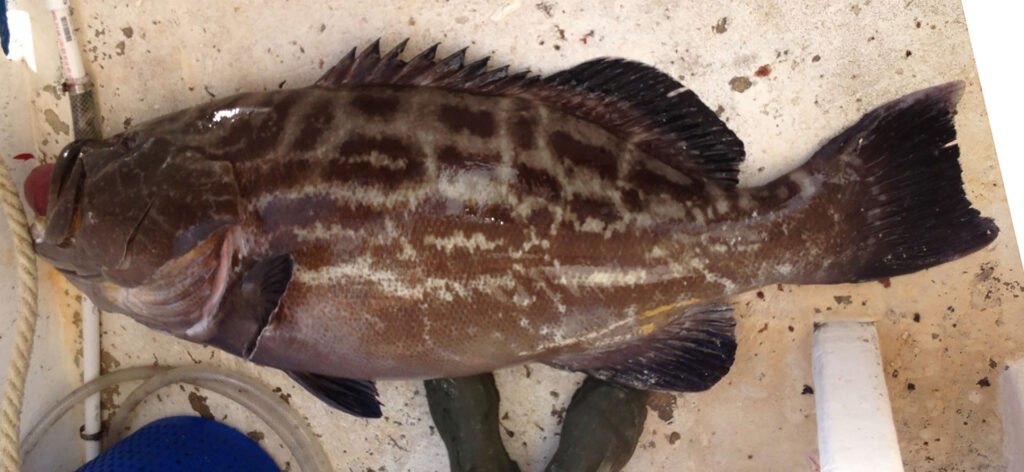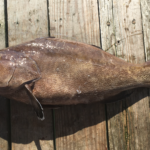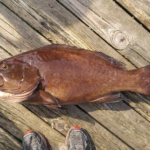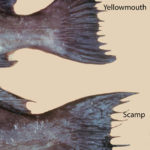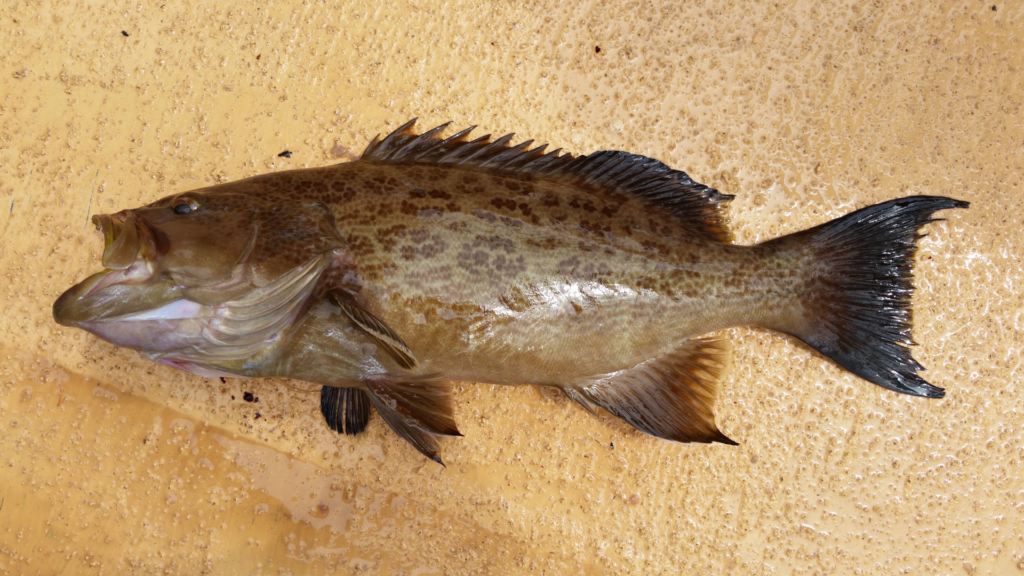
| Family | Scientific Name | Author | Year | Common Name |
| Serranidae | Mycteroperca phenax | Jordan and Swain | 1884 | Scamp |
All Mycteroperca — Dorsal fin with 10 or 11 spines and 13-19 rays. Anal fin with 3 spines and 10-13 rays. Most of upper edge of operculum free, not connected by skin to body. Caudal fin rounded, truncate, or emarginate. Head larger, its length contained 2.3-3.3 times in standard length. Preopercle without a large antrorse spine in most species; middle opercle spine not reaching edge of operculum. Front nostrils variously shaped, but always closer to rear nostrils than to upper lip. A thin, moveable supramaxilla bone along upper, rear edge of maxilla (supramaxilla is covered by skin and not obvious, but it can be discerned by pushing the upper edge of the maxilla with a fingernail or dissecting needle; the supramaxilla is more apparent if the skin is cut and peeled off the free, rear part of the maxilla). Most teeth depressible (hinged). Scaly flap of skin joining upper part of inner (posterior) side of pectoral-fin base to body. Soft dorsal and anal fins mostly covered with thick skin and scales. Scales on body small, lateral scale series (69-146) more numerous than lateral-line scales. No large antrorse spine on corner of preopercle (but there may a few enlarged, ventrally-directed serrae there). Snout longer than eye diameter. Body depth usually not greater than head length, 2.5-3.6 times in standard length. Midlateral body scales rough (smooth on some species of Mycteroperca).
Mycteroperca phenax
Unique Characters: Preopercle (of fish larger than 30 cm) with a distinct notch above the serrate lobe at angle Some median fin rays produced beyond fin membranes in large adults. Lateral-line scales 70-82; lateral-scale series 108-128. Total gill rakers on first arch 27-41. Exserted caudal-fin rays (present only in adults) uneven.
Similar Species:
Gag
Mycteroperca microlepis
Yellowmouth Grouper Mycteroperca interstitialis
Gag Mycteroperca microlepis. Preopercle (of fish larger than 30 cm) with a distinct notch above the serrate lobe at angle Median fins of adults without exserted rays. Head and body brownish or grey, with dark blotches or mottling on sides and dorsally; ventral parts generally pale, but large males often have a dark grey swath from above pelvic fins to underside of caudal peduncle. Lateral line scales 88-96; lateral-scale series 128-146.
Yellowmouth Grouper Mycteroperca interstitialis. Preopercle (of fish larger than 30 cm) with a distinct notch above the serrate lobe at angle Some median fin rays produced beyond fin membranes in large adults. Lateral-line scales 70-82; lateral-scale series 108-128. Total gill rakers on first arch 23-27. Dorsal 1/2 of body with small close-set brown spots; large adults almost uniform brown dorsally. Pectoral fins dark with white margin; mouth and spinous dorsal-fin margin yellow; juveniles bicoloured, dark above and light below. Exserted rays (of adults) project equally beyond caudal-fin membrane. Pelvic-fin 15-17% standard length.
Yellowfin Grouper
Mycteroperca venenosa
Black Grouper
Mycteroperca bonaci
Yellowfin Grouper Mycteroperca venenosa. Preopercle edge without a distinct notch or lobe. Adults with distal third of pectoral fins bright yellow, sharply demarcated from rest of fin; small red spots on lower part of head and body. Rear nostrils about twice size of front nostrils. Total gill rakers on first arch 24-27.
Black Grouper Mycteroperca bonaci. Preopercle edge without a distinct notch or lobe. Pectoral fins of adults with narrow orange or white margin that shades gradually into rest of fin; sides of head and body ventrally with yellowish brown spots surrounded by a pale blue network. Total gill rakers on first arch 17-24. Rear nostrils not much larger than front nostrils.
Gallery
